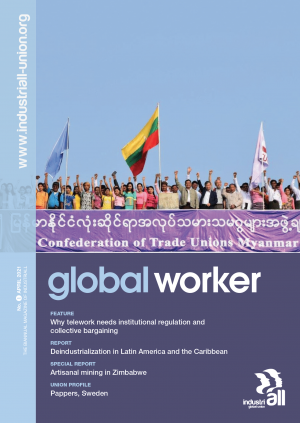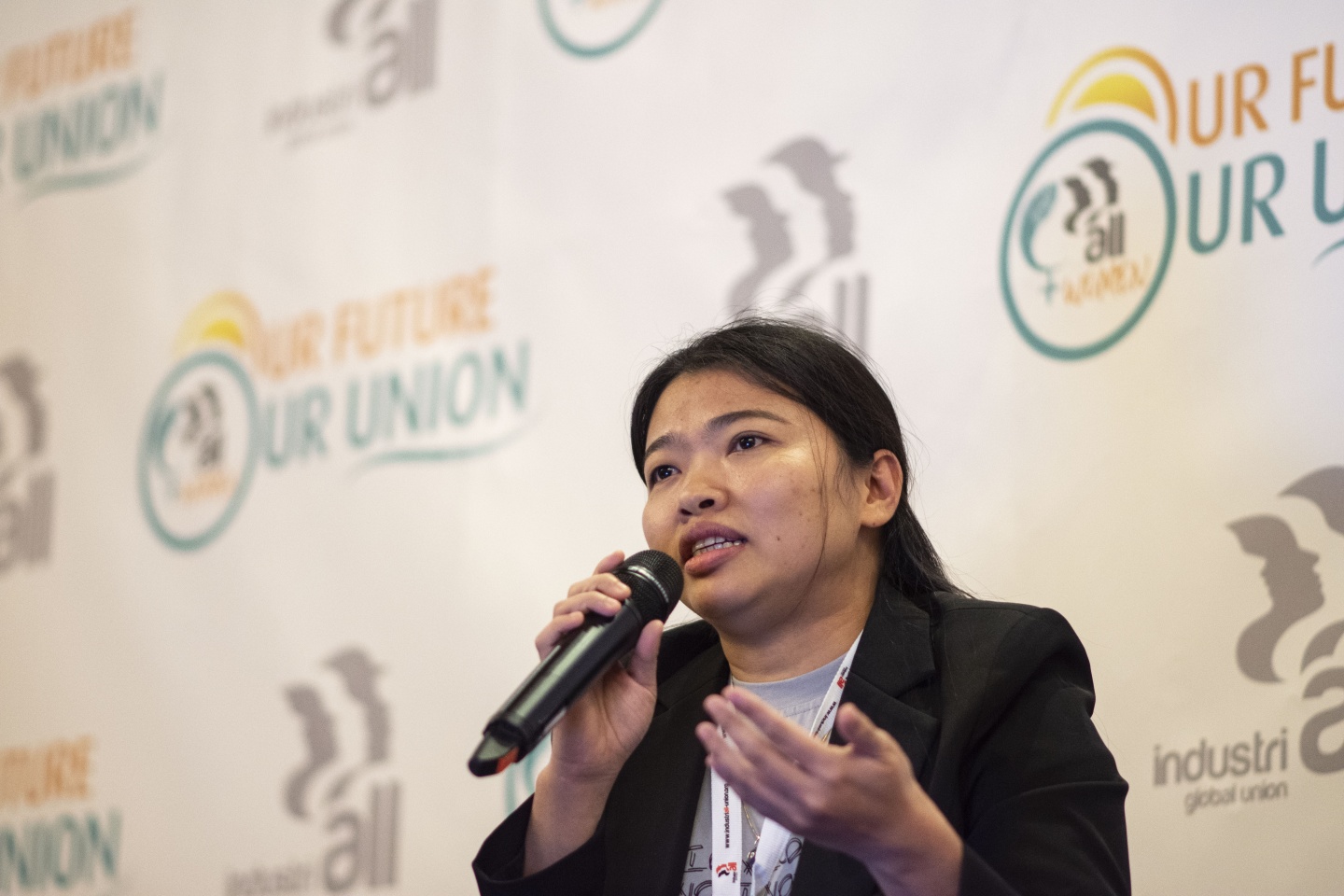23 April, 2021Trade unions have only been allowed in Myanmar since 2012, when the country took its first steps away from a military regime towards democracy. However, in February this year, the military took back power in a coup d’état.
INTERVIEW From Global Worker No. 1 May 2021 | |
 | INTERVIEW: Khaing Zar COUNTRY: Myanmar Text: Petra Brännmark |
As of December 2014, IndustriALL counts two affiliates in Myanmar: the Industrial Workers Federation of Myanmar (IWFM) and the Mining Workers Federation of Myanmar (MWFM). Both trade unions are affiliated to the Confederation of Trade Unions of Myanmar (CTUM).
Khaing Zar is president of IWFM, treasurer of CTUM and member of IndustriALL’s executive committee. Khaing Zar became involved in the trade union movement in 2007, while working in garment factories on the Thai Myanmar border.
How did you become a trade unionist?
I finished high school at 16 and started working to help support to my family. I showed an ID-card of a person who was 25 years old, borrowed from my cousin, and that got me a job in a textile factory. I was subsequently fired from that factory for being under-age; the legal working age in Myanmar is 18.
I then worked in different factories, doing double shifts to be able to attend distance university classes. Once I got my university degree, I found work in garment factories on the other side of the border, in Thailand.
When I was working in factories in Myanmar and in Thailand, I worked with children as young as 13 and 14 who wanted to go back to school.
I was struck by the poor living standards, how workers were exploited, and how little or no chance they had to improve their lives. So, I went to a trade union training session while I was working in a garment factory in Thailand and have not looked back since.
I joined the Federation of Trade Unions Burma (FTUM), now called the Confederation of Trade Unions Myanmar (CTUM), where I have been member of the executive committee since early 2007. At the time, we educated migrant workers in Thailand on Thai labour law to make them aware of their rights, helping workers who had lost their jobs or had problems in the workplace. As trade unions were illegal in Myanmar, we invited workers from Myanmar to come for training in safe places.
What has organizing workers been like since trade unions became legal in Myanmar?
Between 2017 and 2019, IWFM increased its membership from 17,000 to 24,000. However, the pandemic has brought job losses and also a decrease in union membership. Currently, the IWFM counts 13,000 members.
There are different things that make organizing difficult. People see union leaders being dismissed and are afraid to join a union for fear of repercussions. Changing people’s behaviour takes time.
And even though unions are legal, the registration process with authorities is difficult. Officially, the process should take three months but often takes a lot longer, so we encourage local union leaders to start the union work for its members anyway according to the Freedom of Association Guidelines.
Myanmar does not have a tradition of social dialogue and the general knowledge about unions is quite low, both among workers and employers. There is a great need to build functioning labour-management relations at factory level, which will require training of both union and management representatives.
The IWFM does a lot of training for workers, including what is a trade union, what does a union do, what is social dialogue, what are the process of collective bargaining agreement, labour laws, organising strategy, gender equality, occupational health safety and international labour standards.
Many think that the union is about fighting and a class struggle, but it is about education. We want good jobs, and we want to improve working conditions, but it has to be through negotiations. If employers lose business, we lose jobs. We encourage workers to use strike action as a last resort.
What role are unions playing in the civil disobedience movement, protesting against the military rule?
Hundreds of thousands have participated in the peaceful demonstrations across the country. The civil disobedience movement is really bringing together people from all over Myanmar, regardless of ethnical, social or geographical position and workers from different sectors like transport, energy, mining, garment, construction, medical.
Unions have been very active and our members in the garment industry have joined the demonstrations. As you can be dismissed after three days of strikes, there has been negotiations with management for approved leave to join the movement. In some cases, the unions/workers have submitted a letter to the employer that they are joining the peaceful demonstrations, necessary because of the country’s current situation and that they are exercising their basic human and freedom of association rights.
Union leaders have been targeted by the military. Police have issued arrest warrants for 20 union leaders, the majority from IWFM, including our vice president, Ma Soe Lay. Employers have been put under pressure to give up information of the union leaders to the military, and many union leaders have been forced into hiding.
On 14 March, there was a serious attack in Yangon’s biggest industrial zone, Hlaing Thar yar. More than 100 people were killed, and thousands of workers have left the industrial zone because of the shootings and arrests.
Despite the challenges, many factories re-opened in March. There is a real risk of factories using the current situation to terminate workers. If you miss work for more than three days the employer can avoid paying severance, which they would be obliged to do in regular cases of retrenchment. We already see this happening, which is unfair in cases where workers cannot go to work over security concerns.
What does the IWFM need the international community to do?
The IWFM has worked relentlessly to protect the rights and improve the lives of garment workers and their families since we were allowed back into the country after the previous dictatorship, back to Myanmar in 2012.
We will continue to fight back the current military coup because we know how cruel military rule is. And we have had eight years of partial freedom and witnessed the development of the country. No one wants to go back to the dark ages. It is certain that there is no future, no freedom, and no prosperity under military rule.
We need comprehensive sanctions against Myanmar, especially in the oil and gas and the insurance industries to cut the income of the military regime. And we need a general international arms embargo against Myanmar.
IWFM is pushing for the big garment brands that produce in Myanmar to ask suppliers not to punish workers who participate in the protests. And IWFM has called on brands to condemn the military coup in Myanmar and to show that the military coup will have negative impact on foreign investment.
We also need that employers and brands who produce in Myanmar do not to fire workers in the current situation. Many workers have already lost their jobs, trade unionists are forced into hiding and families are without income. Our courageous people continue to defy the brutal terrorist military. Workers and the people of Myanmar need humanitarian help immediately.



